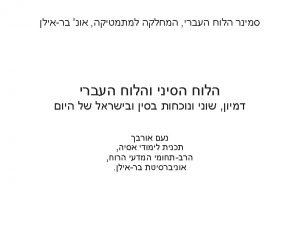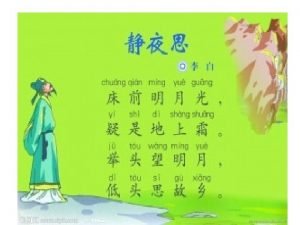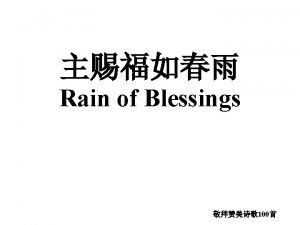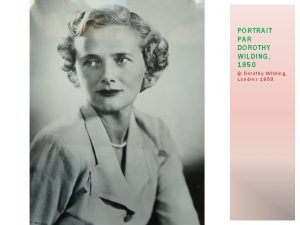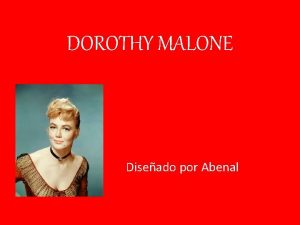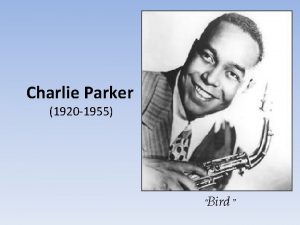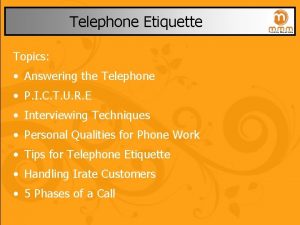A Telephone Call Dorothy Parker Wu Yue 10300120199


























- Slides: 26

A Telephone Call Dorothy Parker Wu Yue 10300120199

About Dorothy Parker Text Analysis Background and Reflection Wit to Appreciate

Dorothy Parker (August 22, 1893 – June 7, 1967) • Poet • Short story writer • Critic • Satirist Best known for: • wit • wisecracks • eye for 20 th century urban foibles

Early literary output: • New Yorker • Vanity Fair Algonquin Round Table: • Dorothy as one of the founding member • an informal luncheon group at the Algonquin Hotel in the nineteen-twenties • re-printing of her lunchtime remarks and short verses • offend powerful producers too often

Hollywood: screenwriting two Academy Award nominations Hollywood blacklist (left-wing politics) Marriage: Sharp wit endured 1 st: Parker 2 nd, 3 rd: Campbell Dorothy Parker: “Big Blonde” (Bookman Magazine, February 1929) • The O. Henry Award, an annual American award given to short stories of exceptional merit

The New York Times wrote: Miss Parker, for all her mercury-quick mind, was a careful, even painful, craftsman. She had her own definition of humor, and it demanded lonely, perfectionist writing to make the truly funny seem casual and uncontrived.

About Dorothy Parker Text Analysis Background and Reflection Wit to Appreciate

Monologue • a sentimental woman tortured by the uncertainty of love Emotional cycle • counting, guessing, waiting, begging, cursing A call from the man (man busy, office; woman doing nothing) Ending unwritten

1 Repetition 2 Stream of Consciousness 3 Satire

Repetition • Numbers: 50, 55, 35 • Words three times in a row: “please, please” “dead, dead” • Dispersed repetition: “let him telephone me now”

1 Repetition 2 Stream of Consciousness 3 Satire

Stream of Consciousness • Cycles of emotional bursts Metaphor: tele- remote • Curse • the telephone men &women • “I'll pull your filthy roots out of the wall, I'll smash your smug black face in little bits. Damn you to hell. ” • herself • “send me to hell” • the man • “hurt him like hell” • “I wish he were dead, dead”

1 Repetition 2 Stream of Consciousness 3 Satire

Satire Women: should not sit and wait for love master of their own fate Male-oriented society Celebrity culture Women writers

About Dorothy Parker Text Analysis Background and Reflection Wit to Appreciate

Enough Rope, one of the first best-selling volumes of poetry in America Short stories, distinction between what the speaker says and what she thinks • “A Telephone Call” (The Bookman, January 1928), • “The Garter” (The New Yorker, September 8, 1928), • “But the One on the Right” (The New Yorker, October 19, 1929), • “Sentiment” (Harper’s Bazaar, May 1933), and • “The Waltz” (The New Yorker, September 2, 1933) the only monologues, indeed the only works, in which Parker explicitly named herself as the protagonist Each female monologist outwardly presented a sacrificial politeness that belied the bitingly satirical mentality within.

• leaving the endings of these stories essentially unwritten • not delivering what the form of the autobiographical monologue promises, namely some insight into the self the alienation the speaker experienced as a woman --- the distinction between what she thinks and what she can properly say

Seeing reviews of her work Hearing accounts of her behavior Having her one-liners quoted back to her the division between external and internal expression in these monologues Awareness that she could no longer completely control her public image Her satirical mockery of what publicity did to women writers

unprecedented public fascination with celebrity culture in America Monologues • Her own personal experience of becoming a public figure • The beginnings of a larger cultural phenomenon of literary celebrity that has come to influence the current market of fiction as well as contemporary literary studies

• Avoided evaluative comparisons to male writers • Wanted to compete with her male contemporaries early twentieth century mass culture in America governed by rigid gender roles Male authors play heroic roles Female authors most often compared to their male contemporaries in pursuit of defining their worth among the cultural elite if “successful”, not successful in dispelling a cultural paradigm that associated masculinity with superior talent and femininity with inferior forms of writing refined, cultured, and sophisticated

a more masculine persona masculinity the rhetorical strategy of satire literary longevity To exploit the literary market To critique the limiting effects of celebrity culture on women writers

Resisting interpretations of the relationship between her work and her “self” to the end of her life, she inspired her last interviewer, Wyatt Cooper, to write “If you didn’t know Dorothy Parker, whatever you think she was like, she wasn’t. Even if you did know her, whatever you thought she was like, she probably wasn’t”. Her image continues to be created, refashioned, and complicated in a way that makes her an especially intriguing figure in light of contemporary observations about the fluid nature of gender.

About Dorothy Parker Text Analysis Background and Reflection Wit to Appreciate

Algonquin Round Table One of her most famous comments was made when the group was informed that former president Calvin Coolidge had died. Parker remarked, "How could they tell? "

Advertisements: One of her earliest ads for Vogue parodies a famous line from Shakespeare’s Polonius: “Brevity is the soul of wit” to describe a line of women’s undergarments: “From these foundations of the autumn wardrobe, one may learn that brevity is the soul of lingerie. ” Continuing this line of humor, Parker again wrote an amusing ad for an expensive but revealing nightgown: “There was a little girl, who had a little curl, right in the middle of her forehead. When she was good, she was very good, and when she was bad, she wore this divine nightdress of rose-colored mousseline de soie, trimmed with frothy Valenciennes lace. (mousseline de soie—silk, Valenciennes –a French Town)

Thank you all!
 Dorothy parker the telephone call
Dorothy parker the telephone call Penelope dorothy parker
Penelope dorothy parker An incoming telephone call should be answered before the
An incoming telephone call should be answered before the Essential business english 4 a telephone call
Essential business english 4 a telephone call Nong li 7 yue
Nong li 7 yue Sara yue
Sara yue Woolbridge surgery
Woolbridge surgery The execution yue minjun
The execution yue minjun A question of dowry character analysis
A question of dowry character analysis Subgrantees
Subgrantees Chuang qian ming yue guang li bai
Chuang qian ming yue guang li bai Wenqi yue
Wenqi yue Yue
Yue Jin tian ji yue ji hao
Jin tian ji yue ji hao Protective put diagram
Protective put diagram Long call short call
Long call short call Qfiniti call recording
Qfiniti call recording Dorothy johnson metaparadigm
Dorothy johnson metaparadigm The richer the poorer by dorothy west
The richer the poorer by dorothy west Conceptualized the behavioral system model
Conceptualized the behavioral system model Dorothy f schmidt college of arts and letters
Dorothy f schmidt college of arts and letters Dorothy edgers pearl harbor
Dorothy edgers pearl harbor William carey missionary in india
William carey missionary in india Dorothy perkins stockists
Dorothy perkins stockists Duo chun yu
Duo chun yu Definicija zdravstvene njege
Definicija zdravstvene njege Dorothy height sorority
Dorothy height sorority




